See Page 1 |
2 |
3 |
4 | of the January 2024 homepage
archives. Sunday the 14th
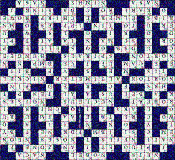 This custom RF Cafe
electronics-themed crossword puzzle for January 14th contains only clues and
terms associated with engineering, science, physical, astronomy, mathematics, chemistry,
etc., which I have built up over more than two decades. Being the 14th day, words
containing the letter "N" are marked with an asterisk (*). Many new words and company
names have been added that had not even been added to the world's technical lexicon
when I started in the year 2002. As always, this crossword contains no names of
politicians, mountain ranges, exotic foods or plants, movie stars, or anything of
the sort unless it/he/she is related to this puzzle's technology theme. You might,
however, encounter the name of a movie star like Hedy Lamarr or a geographical location
like Tunguska, Russia, for reasons which, if you don't already know, might surprise
you. The technically inclined cruciverbalists amongst us will appreciate the effort.
A full list of all RF Cafe crosswords is at the page bottom. Enjoy! This custom RF Cafe
electronics-themed crossword puzzle for January 14th contains only clues and
terms associated with engineering, science, physical, astronomy, mathematics, chemistry,
etc., which I have built up over more than two decades. Being the 14th day, words
containing the letter "N" are marked with an asterisk (*). Many new words and company
names have been added that had not even been added to the world's technical lexicon
when I started in the year 2002. As always, this crossword contains no names of
politicians, mountain ranges, exotic foods or plants, movie stars, or anything of
the sort unless it/he/she is related to this puzzle's technology theme. You might,
however, encounter the name of a movie star like Hedy Lamarr or a geographical location
like Tunguska, Russia, for reasons which, if you don't already know, might surprise
you. The technically inclined cruciverbalists amongst us will appreciate the effort.
A full list of all RF Cafe crosswords is at the page bottom. Enjoy!
 This assortment of custom-designed themes
by RF Cafe includes T-Shirts, Mouse Pads, Clocks, Tote Bags, Coffee Mugs and Steins,
Purses, Sweatshirts, Baseball Caps, and more, all sporting my amazingly clever "RF Engineers - We Are the World's
Matchmakers" Smith chart design. These would make excellent gifts for husbands,
wives, kids, significant others, and for handing out at company events or as rewards
for excellent service. My graphic has been ripped off by other people and used on
their products, so please be sure to purchase only official RF Cafe gear. I only
make a couple bucks on each sale - the rest goes to Cafe Press. It's a great way
to help support RF Cafe. Thanks... This assortment of custom-designed themes
by RF Cafe includes T-Shirts, Mouse Pads, Clocks, Tote Bags, Coffee Mugs and Steins,
Purses, Sweatshirts, Baseball Caps, and more, all sporting my amazingly clever "RF Engineers - We Are the World's
Matchmakers" Smith chart design. These would make excellent gifts for husbands,
wives, kids, significant others, and for handing out at company events or as rewards
for excellent service. My graphic has been ripped off by other people and used on
their products, so please be sure to purchase only official RF Cafe gear. I only
make a couple bucks on each sale - the rest goes to Cafe Press. It's a great way
to help support RF Cafe. Thanks...
Friday the 12th
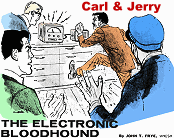 An Internet search for a perchlorethylene
(PCE) detector made by Honeywell in the 1960s turned up nothing other than a reference
to this John T. Frye Carl & Jerry article in Popular Electronics
magazine. PCE is a toxic substance which was formerly (and possibly still is) used
in the clothes dry cleaning business and as a degreaser. The substance is central
to this "The
Electric Bloodhound" technodrama in the September 1964 issue of PE
magazine. In his typical style, Mr. Frye uses these stories as a teaching medium
while entertaining with the exploits of a couple teenaged electronics junkies who
by now are in college studying electrical engineering. This time, Jerry is in the
lab admiring a new type of detector that monitors the concentration of certain particulates
in the air, and sound an alarm if it exceeds a defined level. By an incredible coincidence,
while explaining its operational principle to Carl, that device proves to be useful
in collaring a thief... An Internet search for a perchlorethylene
(PCE) detector made by Honeywell in the 1960s turned up nothing other than a reference
to this John T. Frye Carl & Jerry article in Popular Electronics
magazine. PCE is a toxic substance which was formerly (and possibly still is) used
in the clothes dry cleaning business and as a degreaser. The substance is central
to this "The
Electric Bloodhound" technodrama in the September 1964 issue of PE
magazine. In his typical style, Mr. Frye uses these stories as a teaching medium
while entertaining with the exploits of a couple teenaged electronics junkies who
by now are in college studying electrical engineering. This time, Jerry is in the
lab admiring a new type of detector that monitors the concentration of certain particulates
in the air, and sound an alarm if it exceeds a defined level. By an incredible coincidence,
while explaining its operational principle to Carl, that device proves to be useful
in collaring a thief...
 James Clerk Maxwell's inception of the theory
of electromagnetic radiation is compared in this 1930 Radio-Craft magazine
article to if Christopher Columbus had conceptualized the existence of America and
mapped its features based solely on observations of how the known oceans and land
masses interacted. I have always been amazed at the ability of people who formulate
entirely new theories of science, finance, medicine, etc., and manage to detail
and support their ideas with hard data and mathematics. Einstein did so with relativity,
Dalton did so with atomic structure, Darwin did so with evolution, Pasteur did so
with germ theory; the list is long. There are lots of geniuses out there, but a
relative few change the world. James Clerk Maxwell's inception of the theory
of electromagnetic radiation is compared in this 1930 Radio-Craft magazine
article to if Christopher Columbus had conceptualized the existence of America and
mapped its features based solely on observations of how the known oceans and land
masses interacted. I have always been amazed at the ability of people who formulate
entirely new theories of science, finance, medicine, etc., and manage to detail
and support their ideas with hard data and mathematics. Einstein did so with relativity,
Dalton did so with atomic structure, Darwin did so with evolution, Pasteur did so
with germ theory; the list is long. There are lots of geniuses out there, but a
relative few change the world.
 Radio talk show hosts are a dime a dozen,
and prior to readily available streaming services on the Internet, most never had
a reach beyond the over-the-air reception range of the local radio station. In the
early days of talk radio, AM was almost exclusively the domain of the craft. As
its popularity increased, FM channels began picking it up because a lot of advertising
money followed popular hosts. Rush Limbaugh, of course, was responsible for resurrecting
the nearly dead format and motivating many imitators, many of whom have gone on
to build loyal listeners. While living in Erie, PA, I discovered a guy named Jim
Quinn broadcasting on WPGB out of Pittsburgh along with his sidekick, Rose Tennet.
New station ownership replaced them with a sports show (which bombed). Being a multi-decade
entrepreneur in the radio business, Quinn contracted with WYSL in Rochester, NY,
to air his Quinn in the Morning show. Rose, now a professional podcaster, did an
interview with Quinn in a piece entitled "The
Life and Times of a Recovering Disc Jockey." This Rumble video is the story
of his 60+ years in the radio business, and runs like a highly motivational TED
Talk... Radio talk show hosts are a dime a dozen,
and prior to readily available streaming services on the Internet, most never had
a reach beyond the over-the-air reception range of the local radio station. In the
early days of talk radio, AM was almost exclusively the domain of the craft. As
its popularity increased, FM channels began picking it up because a lot of advertising
money followed popular hosts. Rush Limbaugh, of course, was responsible for resurrecting
the nearly dead format and motivating many imitators, many of whom have gone on
to build loyal listeners. While living in Erie, PA, I discovered a guy named Jim
Quinn broadcasting on WPGB out of Pittsburgh along with his sidekick, Rose Tennet.
New station ownership replaced them with a sports show (which bombed). Being a multi-decade
entrepreneur in the radio business, Quinn contracted with WYSL in Rochester, NY,
to air his Quinn in the Morning show. Rose, now a professional podcaster, did an
interview with Quinn in a piece entitled "The
Life and Times of a Recovering Disc Jockey." This Rumble video is the story
of his 60+ years in the radio business, and runs like a highly motivational TED
Talk...
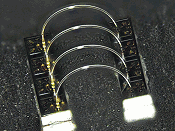 "We are reaching - or have reached - the
limits of electrical signaling and data transfer in hyperscale/HPC data center and
supercomputing environments. AI and ML workloads are growing exponentially and pushing
the physical capabilities of standard electrical interconnects. Transmission rates
of 400G and 800G within data centers are becoming well-established within HPC environments
and will replace all 100G and 200G interfaces within the next several years. Innovators
have in recent years turned to optical I/O to address these challenges, primarily
because beyond 400G, the power needed to drive electrical signals to a fiber optic
interface will become unsustainable. A new polymer-wire–based solution, known as
direct optical wiring (DOW), is now commercially available and is meeting this
objective. Similar to metal wire bonding in electronics, DOW polymer wires range
from 100 nm to 100 µ in length and serve as a replacement for lens-based optical
connections between light source and fiber facet. The technology has already been
proven in the consumer electronics space and is now being applied to 800G pluggable
modules for hyperscale and supercomputing applications. Multimode-based optical
interconnects..." "We are reaching - or have reached - the
limits of electrical signaling and data transfer in hyperscale/HPC data center and
supercomputing environments. AI and ML workloads are growing exponentially and pushing
the physical capabilities of standard electrical interconnects. Transmission rates
of 400G and 800G within data centers are becoming well-established within HPC environments
and will replace all 100G and 200G interfaces within the next several years. Innovators
have in recent years turned to optical I/O to address these challenges, primarily
because beyond 400G, the power needed to drive electrical signals to a fiber optic
interface will become unsustainable. A new polymer-wire–based solution, known as
direct optical wiring (DOW), is now commercially available and is meeting this
objective. Similar to metal wire bonding in electronics, DOW polymer wires range
from 100 nm to 100 µ in length and serve as a replacement for lens-based optical
connections between light source and fiber facet. The technology has already been
proven in the consumer electronics space and is now being applied to 800G pluggable
modules for hyperscale and supercomputing applications. Multimode-based optical
interconnects..."
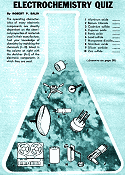 A lot of RF Cafe visitors might not be familiar
with some of the electronic devices presented in this
Electrochemistry Quiz by Popular Electronics magazine's resident quizmaster,
Robert Balin (a big list of his other quizzes is at the bottom of the page). Since
some of these items are not in the most recognizable packaging format, I offer my
assistance to help assure your ultimate success. A is a photocell, B is an early
type of rectifier, C is a varistor, D is a cathode ray tube (CRT), E is an electrolytic
capacitor, F is a heated cathode in a vacuum tube, G is a flashlight battery, H
is an early receiver crystal detector, I is a magnetic audio recording tape, and
J is phonograph cartridge. I scored 60% - sad... A lot of RF Cafe visitors might not be familiar
with some of the electronic devices presented in this
Electrochemistry Quiz by Popular Electronics magazine's resident quizmaster,
Robert Balin (a big list of his other quizzes is at the bottom of the page). Since
some of these items are not in the most recognizable packaging format, I offer my
assistance to help assure your ultimate success. A is a photocell, B is an early
type of rectifier, C is a varistor, D is a cathode ray tube (CRT), E is an electrolytic
capacitor, F is a heated cathode in a vacuum tube, G is a flashlight battery, H
is an early receiver crystal detector, I is a magnetic audio recording tape, and
J is phonograph cartridge. I scored 60% - sad...
 It was a lot of work, but I finally finished
a version of the "RF &
Electronics Schematic & Block Diagram Symbols"" that works well with Microsoft
Office™ programs Word™, Excel™, and Power Point™. This is an equivalent of the extensive
set of amplifier, mixer, filter, switch, connector, waveguide, digital, analog,
antenna, and other commonly used symbols for system block diagrams and schematics
created for Visio™. Each of the 1,000 or so symbols was exported individually from
Visio in the EMF file format, then imported into Word on a Drawing Canvas. The EMF
format allows an image to be scaled up or down without becoming pixelated, so all
the shapes can be resized in a document and still look good. The imported symbols
can also be UnGrouped into their original constituent parts for editing. Check them
out! It was a lot of work, but I finally finished
a version of the "RF &
Electronics Schematic & Block Diagram Symbols"" that works well with Microsoft
Office™ programs Word™, Excel™, and Power Point™. This is an equivalent of the extensive
set of amplifier, mixer, filter, switch, connector, waveguide, digital, analog,
antenna, and other commonly used symbols for system block diagrams and schematics
created for Visio™. Each of the 1,000 or so symbols was exported individually from
Visio in the EMF file format, then imported into Word on a Drawing Canvas. The EMF
format allows an image to be scaled up or down without becoming pixelated, so all
the shapes can be resized in a document and still look good. The imported symbols
can also be UnGrouped into their original constituent parts for editing. Check them
out!
 Exodus Advanced Communications is a multinational
RF communication equipment and engineering service company serving both commercial
and government entities and their affiliates worldwide. Power amplifiers ranging
from 10 kHz to 51 GHz with various output power levels and noise figure
ranges, we fully support custom designs and manufacturing requirements for both
small and large volume levels. decades of combined experience in the RF field for
numerous applications including military jamming, communications, radar, EMI/EMC
and various commercial projects with all designing and manufacturing of our HPA,
MPA, and LNA products in-house. Exodus Advanced Communications is a multinational
RF communication equipment and engineering service company serving both commercial
and government entities and their affiliates worldwide. Power amplifiers ranging
from 10 kHz to 51 GHz with various output power levels and noise figure
ranges, we fully support custom designs and manufacturing requirements for both
small and large volume levels. decades of combined experience in the RF field for
numerous applications including military jamming, communications, radar, EMI/EMC
and various commercial projects with all designing and manufacturing of our HPA,
MPA, and LNA products in-house.
Thursday the 11th
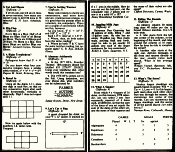 Many of the sets of puzzles and riddles
from earlier Old Farmer's Almanacs (OFA) were very different from the ones
appearing beginning in the mid 1970s. The newer ones are much more concise in the
problem statement and do not require the reader to be privy to what were often esoteric.
1978, the year of this "Old
and New Mathematical Puzzles" collection, will be comfortably approachable even
by today's standards. In the early 2000s, OFA began publishing more numbnutty puzzles
that were very sophomoric. Then for a couple years they published none at all. That's
about the time I stopped my multi-decade practice of buying the OFA every year.
I probably haven't bought one in 15 years. Sad, but true. Although not a farmer,
I always enjoyed reading the monthly astronomical (not astrological) data on sunrise/sunset,
moon phases, etc., weather forecasts, historical events on the calendar pages, and
there was often interesting articles on a wide variety of topics. The last time
I thumbed through an OFA while standing in line at Walmart, it was filled airhead
social behavior and multicultural claptrap. Robert Thomas would probably roll over
in his grave (to use a trite saying) if he knew what has happened to his fine almanac... Many of the sets of puzzles and riddles
from earlier Old Farmer's Almanacs (OFA) were very different from the ones
appearing beginning in the mid 1970s. The newer ones are much more concise in the
problem statement and do not require the reader to be privy to what were often esoteric.
1978, the year of this "Old
and New Mathematical Puzzles" collection, will be comfortably approachable even
by today's standards. In the early 2000s, OFA began publishing more numbnutty puzzles
that were very sophomoric. Then for a couple years they published none at all. That's
about the time I stopped my multi-decade practice of buying the OFA every year.
I probably haven't bought one in 15 years. Sad, but true. Although not a farmer,
I always enjoyed reading the monthly astronomical (not astrological) data on sunrise/sunset,
moon phases, etc., weather forecasts, historical events on the calendar pages, and
there was often interesting articles on a wide variety of topics. The last time
I thumbed through an OFA while standing in line at Walmart, it was filled airhead
social behavior and multicultural claptrap. Robert Thomas would probably roll over
in his grave (to use a trite saying) if he knew what has happened to his fine almanac...
 DFM is a FREE
PCB Manufacturability Analysis Software
Tailored by NEXTPCB for Engineers NEXTPCB is one of the most professional PCB
manufacturers, has specialized in the PCB and assembly industry for over 15 years.
NextPCB dealt with hundreds of and thousands of engineering problems of PCB, and
we know that engineers are troubled by high-cost prices, and too much time in product
communication. We, NEXTPCB, hope that we could use our experience and profession
to stimulate the development of PCB industry and more importantly and realistically,
to improve the efficiency of the process of a PCB file to a PCB product. Therefore,
we created the DFM to help engineers to build a low-cost and high-efficiency PCB
project. With just one click, you can unearth hidden problems of design in Gerber
files and PCB files, and get an optimization plan that combines design and manufacturing... DFM is a FREE
PCB Manufacturability Analysis Software
Tailored by NEXTPCB for Engineers NEXTPCB is one of the most professional PCB
manufacturers, has specialized in the PCB and assembly industry for over 15 years.
NextPCB dealt with hundreds of and thousands of engineering problems of PCB, and
we know that engineers are troubled by high-cost prices, and too much time in product
communication. We, NEXTPCB, hope that we could use our experience and profession
to stimulate the development of PCB industry and more importantly and realistically,
to improve the efficiency of the process of a PCB file to a PCB product. Therefore,
we created the DFM to help engineers to build a low-cost and high-efficiency PCB
project. With just one click, you can unearth hidden problems of design in Gerber
files and PCB files, and get an optimization plan that combines design and manufacturing...
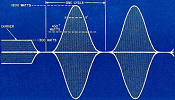 Once frequency modulation (FM) began making
inroads in the commercial radio broadcast world, it wasn't long until the pundits
were writing eulogies for amplitude modulation (AM). There was/is no denying the
superiority of FM in terms of both natural (QRN; e.g., lightning, static, arcing
contacts) and manmade (QRM; e.g., another radio, Wi-Fi, cellular) interference,
but there was already a large installed base of AM radio receivers (and broadcast
transmitters) that satisfied their owners' expectations for listening to news, ball
games, music, and the well-established repertoire of drama and comedy shows. FM
radios were generally more expensive to manufacture, operate, and repair than AM
- at least early on, especially since typically FM sets included AM as well. This
particular article from a 1944 issue of Radio News magazine discusses
class C amplifiers, which is a mode of operation where the circuit is conducting
for less than 180° (half a cycle) when a sinewave is applied. When properly implemented,
class C operation is more efficient than class A (360° conduction) or
class B (180° conduction), or class AB (180° to <360° conduction).
The principles are the same whether vacuum tubes or transistors are used... Once frequency modulation (FM) began making
inroads in the commercial radio broadcast world, it wasn't long until the pundits
were writing eulogies for amplitude modulation (AM). There was/is no denying the
superiority of FM in terms of both natural (QRN; e.g., lightning, static, arcing
contacts) and manmade (QRM; e.g., another radio, Wi-Fi, cellular) interference,
but there was already a large installed base of AM radio receivers (and broadcast
transmitters) that satisfied their owners' expectations for listening to news, ball
games, music, and the well-established repertoire of drama and comedy shows. FM
radios were generally more expensive to manufacture, operate, and repair than AM
- at least early on, especially since typically FM sets included AM as well. This
particular article from a 1944 issue of Radio News magazine discusses
class C amplifiers, which is a mode of operation where the circuit is conducting
for less than 180° (half a cycle) when a sinewave is applied. When properly implemented,
class C operation is more efficient than class A (360° conduction) or
class B (180° conduction), or class AB (180° to <360° conduction).
The principles are the same whether vacuum tubes or transistors are used...
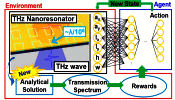 "A team of researchers, led by Professor
Hyong-Ryeol Park from the Department of Physics at UNIST has introduced a technology
capable of
amplifying terahertz (THz) electromagnetic waves by over 30,000 times. This
breakthrough, combined with artificial intelligence (AI) based on physical models,
is set to revolutionize the commercialization of 6G communication frequencies. Collaborating
with Professor Joon Sue Lee from the University of Tennessee and Professor Mina
Yoon from the Oak Ridge National Laboratory, the research team successfully optimized
the THz nanoresonator specifically for 6G communication using advanced optimization
technology. The research findings have been published in the online version of Nano
Letters. By integrating AI learning, based on a physical theoretical model, the
team has enabled the efficient design of THz nanoresonators on personal computers,
a process that was previously time-consuming and demanding even with supercomputers..." "A team of researchers, led by Professor
Hyong-Ryeol Park from the Department of Physics at UNIST has introduced a technology
capable of
amplifying terahertz (THz) electromagnetic waves by over 30,000 times. This
breakthrough, combined with artificial intelligence (AI) based on physical models,
is set to revolutionize the commercialization of 6G communication frequencies. Collaborating
with Professor Joon Sue Lee from the University of Tennessee and Professor Mina
Yoon from the Oak Ridge National Laboratory, the research team successfully optimized
the THz nanoresonator specifically for 6G communication using advanced optimization
technology. The research findings have been published in the online version of Nano
Letters. By integrating AI learning, based on a physical theoretical model, the
team has enabled the efficient design of THz nanoresonators on personal computers,
a process that was previously time-consuming and demanding even with supercomputers..."
 This Radio Service Data Sheet from a 1936
issue of Radio-Craft magazine covers the
Philco Model 59, 4-tube AC Midget superheterodyne receiver. Evidently there
were at least three versions of this, a tabletop radio, a compact tabletop model
(59C), and an "Owl's Eye" model (59S). I'm not sure what the difference is. Most
- if not all - electronics servicemen had subscriptions to these magazines because
they were a ready source of not just these service sheets, but because of the extensive
articles offering advice on servicing radios and televisions. In fact, many electronics
manufacturers had a policy of supplying service data only to bona fide shops. A
large list is included at the bottom of the page of similar documents from vintage
receiver schematics, troubleshooting tips, and alignment procedures. They were originally
published in magazines like Radio-Craft, Radio and Television News,
Radio News, etc. I scan and post them for the benefit of hobbyists who
restore and service vintage electronics equipment... This Radio Service Data Sheet from a 1936
issue of Radio-Craft magazine covers the
Philco Model 59, 4-tube AC Midget superheterodyne receiver. Evidently there
were at least three versions of this, a tabletop radio, a compact tabletop model
(59C), and an "Owl's Eye" model (59S). I'm not sure what the difference is. Most
- if not all - electronics servicemen had subscriptions to these magazines because
they were a ready source of not just these service sheets, but because of the extensive
articles offering advice on servicing radios and televisions. In fact, many electronics
manufacturers had a policy of supplying service data only to bona fide shops. A
large list is included at the bottom of the page of similar documents from vintage
receiver schematics, troubleshooting tips, and alignment procedures. They were originally
published in magazines like Radio-Craft, Radio and Television News,
Radio News, etc. I scan and post them for the benefit of hobbyists who
restore and service vintage electronics equipment...
 With more than 1000
custom-built stencils, this has got to be the most comprehensive set of
Visio Stencils
available for RF, analog, and digital system and schematic drawings! Every stencil
symbol has been built to fit proportionally on the included A-, B-, and C-size drawing
page templates (or use your own page if preferred). Components are provided for
system block diagrams, conceptual drawings, schematics, test equipment, racks (EIA
19", ETSI 21"), and more. Test equipment and racks are built at a 1:1 scale so that
measurements can be made directly using Visio built-in dimensioning objects. Page
templates are provided with a preset scale (changeable) for a good presentation
that can incorporate all provided symbols... With more than 1000
custom-built stencils, this has got to be the most comprehensive set of
Visio Stencils
available for RF, analog, and digital system and schematic drawings! Every stencil
symbol has been built to fit proportionally on the included A-, B-, and C-size drawing
page templates (or use your own page if preferred). Components are provided for
system block diagrams, conceptual drawings, schematics, test equipment, racks (EIA
19", ETSI 21"), and more. Test equipment and racks are built at a 1:1 scale so that
measurements can be made directly using Visio built-in dimensioning objects. Page
templates are provided with a preset scale (changeable) for a good presentation
that can incorporate all provided symbols...
Wednesday the 10th
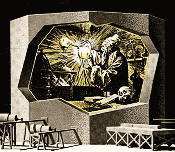 Radiochemist? That's a new term in my lexicon.
Reading through this 1948 Popular Science magazine "U.S.
Alchemists Make Gold" article, I was thinking it could have been a chapter out
of one of the old Tom Swift novels (of which I have read many), by Victor Appleton.
In one of the stories, Tom invented a new highly fissionable element he named "swiftonium,"
but it was not located above uranium in the Periodic Table, so obviously not possible
since all the slots of naturally occurring elements from 1 (helium) through 92 (uranium)
were filled. An element's atomic number is defined solely by the number of protons
in its nucleus, and there can be no fractional elements. If this had been an April
edition, then I might suspect it was a story for "fools." Swiftonium was just a
bit of science fiction Tom Foolery (see what i did there?). Alchemy is not necessarily
creating new elements but converting one element into another. Of course we know
that can be done via fission and fusion, or by allowing a radioactive element to
naturally decay, but alchemists sought to control the process by simple means... Radiochemist? That's a new term in my lexicon.
Reading through this 1948 Popular Science magazine "U.S.
Alchemists Make Gold" article, I was thinking it could have been a chapter out
of one of the old Tom Swift novels (of which I have read many), by Victor Appleton.
In one of the stories, Tom invented a new highly fissionable element he named "swiftonium,"
but it was not located above uranium in the Periodic Table, so obviously not possible
since all the slots of naturally occurring elements from 1 (helium) through 92 (uranium)
were filled. An element's atomic number is defined solely by the number of protons
in its nucleus, and there can be no fractional elements. If this had been an April
edition, then I might suspect it was a story for "fools." Swiftonium was just a
bit of science fiction Tom Foolery (see what i did there?). Alchemy is not necessarily
creating new elements but converting one element into another. Of course we know
that can be done via fission and fusion, or by allowing a radioactive element to
naturally decay, but alchemists sought to control the process by simple means...
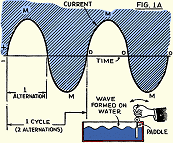 Author George Shuart published this first
of a multipart series of
basic electronics theory in the September 1935 issue of Short Wave Craft
magazine. He began with alternating current and the familiar analogy to various
forms of mechanical oscillations, specifically, waves on the surface of water when
agitated in a sinusoidal manner. Translating a point on a rotating disc into a time-varying
plot is also demonstrated. His transformer analogy of voltage and current ratios
as a function of power conservation between primary and secondary windings uses
a hydraulic system that exploits a mechanical advantage... Author George Shuart published this first
of a multipart series of
basic electronics theory in the September 1935 issue of Short Wave Craft
magazine. He began with alternating current and the familiar analogy to various
forms of mechanical oscillations, specifically, waves on the surface of water when
agitated in a sinusoidal manner. Translating a point on a rotating disc into a time-varying
plot is also demonstrated. His transformer analogy of voltage and current ratios
as a function of power conservation between primary and secondary windings uses
a hydraulic system that exploits a mechanical advantage...
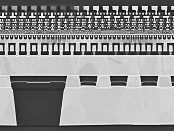 "For the past five years, Intel has lagged
behind Taiwan Semiconductor Manufacturing Co. and Samsung in advanced chip manufacturing.
Now, in an attempt to regain the lead, the company is making a bold - and risky
- move, introducing two novel technologies in its desktop and laptop Arrow Lake
processor, due out in late 2024. Intel hopes to leapfrog its competitors with new
transistor technology and a power-delivery system that would be the first of its
kind. Over the past two decades, Intel has led the field in making key changes to
the transistor architecture, says Chris Auth, Intel's vice president of technology
development and director of advanced transistor development. The company's chip
production, however, has a more checkered past: In 2018, Intel couldn't deliver
its first 10-nanometer CPU on
time, and manufacturing of the chip was postponed a year, creating a shortage of
CPUs made using its 14-nm technology..." "For the past five years, Intel has lagged
behind Taiwan Semiconductor Manufacturing Co. and Samsung in advanced chip manufacturing.
Now, in an attempt to regain the lead, the company is making a bold - and risky
- move, introducing two novel technologies in its desktop and laptop Arrow Lake
processor, due out in late 2024. Intel hopes to leapfrog its competitors with new
transistor technology and a power-delivery system that would be the first of its
kind. Over the past two decades, Intel has led the field in making key changes to
the transistor architecture, says Chris Auth, Intel's vice president of technology
development and director of advanced transistor development. The company's chip
production, however, has a more checkered past: In 2018, Intel couldn't deliver
its first 10-nanometer CPU on
time, and manufacturing of the chip was postponed a year, creating a shortage of
CPUs made using its 14-nm technology..."
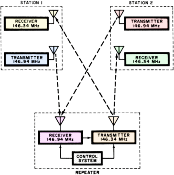 Prior to the advent of earth-orbiting satellites,
very long range communications like between continents was dependent on the state
of the various ionosphere levels. There is never a completely predictable "open"
channel from point A to point B. A satellite repeater, however, while not always
in a position to be within view of both points, at least is predictable based on
a published ephemeris of times and positions. The first OSCAR (Orbiting
Satellite Carrying Amateur Radio), now governed by AMSAT, was launched in December
of 1961. This 1973 article in Popular Electronics magazine mentions OSCAR 6,
which was launched in October 1972... Prior to the advent of earth-orbiting satellites,
very long range communications like between continents was dependent on the state
of the various ionosphere levels. There is never a completely predictable "open"
channel from point A to point B. A satellite repeater, however, while not always
in a position to be within view of both points, at least is predictable based on
a published ephemeris of times and positions. The first OSCAR (Orbiting
Satellite Carrying Amateur Radio), now governed by AMSAT, was launched in December
of 1961. This 1973 article in Popular Electronics magazine mentions OSCAR 6,
which was launched in October 1972...
 RF Cascade Workbook is the next phase in the evolution of RF Cafe's long-running
series, RF Cascade Workbook. Chances are you have never used a spreadsheet
quite like this (click
here for screen capture). It is a full-featured RF system cascade parameter
and frequency planner that includes filters and mixers for a mere $45. Built in
MS Excel, using RF Cascade Workbook 2018 is a cinch and the format
is entirely customizable. It is significantly easier and faster than using a multi-thousand
dollar simulator when a high level system analysis is all that is needed. An intro
video takes you through the main features...
RF Cascade Workbook is the next phase in the evolution of RF Cafe's long-running
series, RF Cascade Workbook. Chances are you have never used a spreadsheet
quite like this (click
here for screen capture). It is a full-featured RF system cascade parameter
and frequency planner that includes filters and mixers for a mere $45. Built in
MS Excel, using RF Cascade Workbook 2018 is a cinch and the format
is entirely customizable. It is significantly easier and faster than using a multi-thousand
dollar simulator when a high level system analysis is all that is needed. An intro
video takes you through the main features...
 LadyBug Technologies was founded in 2004
by two microwave engineers with a passion for quality microwave test instrumentation.
Our employees offer many years experience in the design and manufacture of the worlds
best vector network analyzers, spectrum analyzers, power meters and associated components.
The management team has additional experience in optical power testing, military
radar and a variety of programming environments including LabVIEW, VEE and other
languages often used in programmatic systems. Extensive experience in a broad spectrum
of demanding measurement applications. You can be assured that our Power Sensors
are designed, built, tested and calibrated without compromise. LadyBug Technologies was founded in 2004
by two microwave engineers with a passion for quality microwave test instrumentation.
Our employees offer many years experience in the design and manufacture of the worlds
best vector network analyzers, spectrum analyzers, power meters and associated components.
The management team has additional experience in optical power testing, military
radar and a variety of programming environments including LabVIEW, VEE and other
languages often used in programmatic systems. Extensive experience in a broad spectrum
of demanding measurement applications. You can be assured that our Power Sensors
are designed, built, tested and calibrated without compromise.
Tuesday the 9th
 Tom McCahill was Mechanix Illustrated
(MI) magazine's automotive guru from the late 1940s through the early 1970s.
He sometimes wrote for other magazines such as Popular Mechanics as well,
but was best known for his testing and review of new car models, and for his witty
- sometimes biting - question and answer column in MI. When I first began reading
his "Mail
for McCahill" works, I thought he was too haughty and abrupt with some readers,
but then realized the responses were a clever and often humorous reply to someone's
misinformed, snarky, or plain old stupid question. The one about the psychologist
is a good illustration. His self-deprecating remark offsets what was probably an
insulting insinuation by the reader. In fact, Mr. McCahill was very knowledgeable
of engines, transmissions, suspensions, frameworks, pricing, model features, etc.
Naturally, some of his opinions reflected a personal bias in certain areas, and
that could earn him the scorn of dissenters. I find it to be entertaining and educational
reading... Tom McCahill was Mechanix Illustrated
(MI) magazine's automotive guru from the late 1940s through the early 1970s.
He sometimes wrote for other magazines such as Popular Mechanics as well,
but was best known for his testing and review of new car models, and for his witty
- sometimes biting - question and answer column in MI. When I first began reading
his "Mail
for McCahill" works, I thought he was too haughty and abrupt with some readers,
but then realized the responses were a clever and often humorous reply to someone's
misinformed, snarky, or plain old stupid question. The one about the psychologist
is a good illustration. His self-deprecating remark offsets what was probably an
insulting insinuation by the reader. In fact, Mr. McCahill was very knowledgeable
of engines, transmissions, suspensions, frameworks, pricing, model features, etc.
Naturally, some of his opinions reflected a personal bias in certain areas, and
that could earn him the scorn of dissenters. I find it to be entertaining and educational
reading...
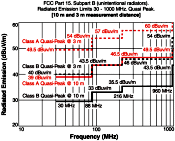 "Everyone enjoys the advantages of electronic
devices and gadgets becoming smaller, lighter, and faster while providing longer
battery life and ever-improving processing ability. Smaller devices require smaller
electronic components - an advantage in reducing
electromagnetic interference (EMI). However, a compact design also means smaller
spacing between components, circuit traces, and enclosures, which can lead to increased
field interactions, current loops, ground loops, crosstalk, and other potential
sources of EMI. We benefit from the convenience of televisions, cell phones, digital
tablets, notebook computers, and IoT devices, all operating at the same time while
appliance motors, lights, fans, and HVAC units are operating in the background to
keep us comfortable. With multiple electrical and wireless electronic devices operating
at the same time, signals must remain reliable in electromagnetically noisy environments.
The rapid growth of the electric vehicle (EV) and hybrid electric vehicle (HEV)
market raises new electromagnetic compatibility (EMC) concerns as high-voltage batteries
and chargers see increased use. High-voltage and high-frequency automotive electronics,
if not properly designed, can lead to EMC compliance headaches..." "Everyone enjoys the advantages of electronic
devices and gadgets becoming smaller, lighter, and faster while providing longer
battery life and ever-improving processing ability. Smaller devices require smaller
electronic components - an advantage in reducing
electromagnetic interference (EMI). However, a compact design also means smaller
spacing between components, circuit traces, and enclosures, which can lead to increased
field interactions, current loops, ground loops, crosstalk, and other potential
sources of EMI. We benefit from the convenience of televisions, cell phones, digital
tablets, notebook computers, and IoT devices, all operating at the same time while
appliance motors, lights, fans, and HVAC units are operating in the background to
keep us comfortable. With multiple electrical and wireless electronic devices operating
at the same time, signals must remain reliable in electromagnetically noisy environments.
The rapid growth of the electric vehicle (EV) and hybrid electric vehicle (HEV)
market raises new electromagnetic compatibility (EMC) concerns as high-voltage batteries
and chargers see increased use. High-voltage and high-frequency automotive electronics,
if not properly designed, can lead to EMC compliance headaches..."
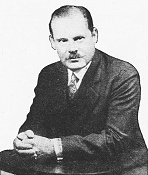 The name
Ernst Frederick Werner Alexanderson (1878-1975) might not seem overly familiar
to you, but he is credited with designing the first high frequency alternator for
transmitting longwave audio modulation over long distances. His device preceded
the spark and arc type transmitters that infamously spewed harmonics and noise all
over the spectrum and were therefore a great nuisance when broadcast at high power
levels. It was a relatively (for the time) narrowband scheme that permitted more
stations to be co-located in a given service area. He went on the develop one of
the first successful television projectors as well. Read a short biography on Mr. Alexanderson
in the "Men Who Have Made Radio" series by 1930 edition of Radio-Craft
magazine... The name
Ernst Frederick Werner Alexanderson (1878-1975) might not seem overly familiar
to you, but he is credited with designing the first high frequency alternator for
transmitting longwave audio modulation over long distances. His device preceded
the spark and arc type transmitters that infamously spewed harmonics and noise all
over the spectrum and were therefore a great nuisance when broadcast at high power
levels. It was a relatively (for the time) narrowband scheme that permitted more
stations to be co-located in a given service area. He went on the develop one of
the first successful television projectors as well. Read a short biography on Mr. Alexanderson
in the "Men Who Have Made Radio" series by 1930 edition of Radio-Craft
magazine...
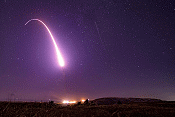 This doesn't bode well. "The aging Minuteman
III intercontinental ballistic missiles that have formed the land-based leg of the
nation's nuclear deterrent triad for half a century can no longer be upgraded and
require costly replacements, Adm. Charles Richard, head of U.S. Strategic Command,
said Tuesday. 'Let me be very clear: You cannot life-extend the Minuteman III,'
he said of the 400 ICBMs that sit in underground silos across five states in the
upper Midwest. 'We can't do it at all. ... That thing is so old that, in some cases,
the drawings don't exist anymore,' Richard said in a Zoom conference sponsored by
the Defense Writers Group. Where the drawings do exist, 'they're like six generations
behind the industry standard,' he said, adding that
there are also no technicians who fully understand them. 'They're not alive
anymore.' 'I don't understand, frankly, how someone in a think tank, who actually
doesn't have their hands on the missile looking at the parts, the cables, all of
the pieces inside' can make judgments on the way forward..." This doesn't bode well. "The aging Minuteman
III intercontinental ballistic missiles that have formed the land-based leg of the
nation's nuclear deterrent triad for half a century can no longer be upgraded and
require costly replacements, Adm. Charles Richard, head of U.S. Strategic Command,
said Tuesday. 'Let me be very clear: You cannot life-extend the Minuteman III,'
he said of the 400 ICBMs that sit in underground silos across five states in the
upper Midwest. 'We can't do it at all. ... That thing is so old that, in some cases,
the drawings don't exist anymore,' Richard said in a Zoom conference sponsored by
the Defense Writers Group. Where the drawings do exist, 'they're like six generations
behind the industry standard,' he said, adding that
there are also no technicians who fully understand them. 'They're not alive
anymore.' 'I don't understand, frankly, how someone in a think tank, who actually
doesn't have their hands on the missile looking at the parts, the cables, all of
the pieces inside' can make judgments on the way forward..."
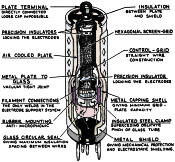 This 1933 Radio-Craft magazine
article is typical of the much-hyped (at the time)
all-metal vacuum tubes in the mid 1930s. Their British proponents predicted
glass-encased tubes would quickly become obsolete once everyone realized how the
added expense of metal encasement would easily be offset by the many advantages
offered by metal tubes. Like so many grand new innovations with fantastic promises,
this one never quite panned out. Metal tubes have/had their place in certain applications,
but turned out not to be the panacea hoped for. Undeniably, superior noise immunity
and greater ruggedness and thus reliability are features difficult to replicate
in glass tubes, but not all tubes needed such perfection. If you are interested
in the history of metal tubes, then check out this article which was later referenced
in an October 1935 piece where it says, "Several years ago, an English company started
to manufacture wholly metallic tubes in which practically no glass was used except
in connection... This 1933 Radio-Craft magazine
article is typical of the much-hyped (at the time)
all-metal vacuum tubes in the mid 1930s. Their British proponents predicted
glass-encased tubes would quickly become obsolete once everyone realized how the
added expense of metal encasement would easily be offset by the many advantages
offered by metal tubes. Like so many grand new innovations with fantastic promises,
this one never quite panned out. Metal tubes have/had their place in certain applications,
but turned out not to be the panacea hoped for. Undeniably, superior noise immunity
and greater ruggedness and thus reliability are features difficult to replicate
in glass tubes, but not all tubes needed such perfection. If you are interested
in the history of metal tubes, then check out this article which was later referenced
in an October 1935 piece where it says, "Several years ago, an English company started
to manufacture wholly metallic tubes in which practically no glass was used except
in connection...
 Banner Ads are rotated in all locations
on the page! RF Cafe typically receives 8,000-15,000 visits each
weekday. RF Cafe
is a favorite of engineers, technicians, hobbyists, and students all over the world.
With more than 17,000 pages in the Google search index, RF Cafe returns in
favorable positions on many types of key searches, both for text and images.
Your Banner Ads are displayed on average 280,000 times per year! New content
is added on a daily basis, which keeps the major search engines interested enough
to spider it multiple times each day. Items added on the homepage often can be found
in a Google search within a few hours of being posted. If you need your company news to be seen, RF Cafe is the
place to be... Banner Ads are rotated in all locations
on the page! RF Cafe typically receives 8,000-15,000 visits each
weekday. RF Cafe
is a favorite of engineers, technicians, hobbyists, and students all over the world.
With more than 17,000 pages in the Google search index, RF Cafe returns in
favorable positions on many types of key searches, both for text and images.
Your Banner Ads are displayed on average 280,000 times per year! New content
is added on a daily basis, which keeps the major search engines interested enough
to spider it multiple times each day. Items added on the homepage often can be found
in a Google search within a few hours of being posted. If you need your company news to be seen, RF Cafe is the
place to be...
Monday the 8th
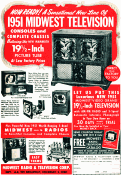 The 1951 line of
Midwest televisions are out, with the latest technical innovations that will
make you the envy of the neighborhood! A 19½" picture was a big deal*, even if it
was only black and white (B&W). The only thing related to color TV at the time
was the 4-color catalog offered in the ad. A well-heeled buyer could opt for a combination
TV, phonograph, and radio version, all contained within a beautiful authentic wooden
cabinet. No prices were given. I never realized that unsynchronized sound and picture
was a problem with television, but evidently solving the problem was worth noting
in this full-page advertisement for the December 1950 edition of Mechanix Illustrated
magazine. Given that the audio and video were part of the same frame of the analog
signal, it is hard to imagine how they could become out of synch. Come to think
of it, though, it is hard to imagine how the audio and video of my DVD movies can
be out of synch, but it sometimes happens... The 1951 line of
Midwest televisions are out, with the latest technical innovations that will
make you the envy of the neighborhood! A 19½" picture was a big deal*, even if it
was only black and white (B&W). The only thing related to color TV at the time
was the 4-color catalog offered in the ad. A well-heeled buyer could opt for a combination
TV, phonograph, and radio version, all contained within a beautiful authentic wooden
cabinet. No prices were given. I never realized that unsynchronized sound and picture
was a problem with television, but evidently solving the problem was worth noting
in this full-page advertisement for the December 1950 edition of Mechanix Illustrated
magazine. Given that the audio and video were part of the same frame of the analog
signal, it is hard to imagine how they could become out of synch. Come to think
of it, though, it is hard to imagine how the audio and video of my DVD movies can
be out of synch, but it sometimes happens...
 Anatech Electronics offers the industry's
largest portfolio of high-performance standard and customized
RF and microwave filters and filter-related products for military, commercial,
aerospace and defense, and industrial applications up to 40 GHz. Three new
filters have been announced for January 2024: a Wi-Fi cavity filter having
a 5510 MHz center frequency and a passband bandwidth of 20 MHz, a multi-operator
combiner covering 806-894 MHz / 902-960 MHz and inband ripple of 0.8 dB,
and a crystal bandpass filter having a center frequency of 70 MHz and a 3dB
bandwidth of 21 kHz. Custom RF power filter and directional couplers designs
can be designed and produced with required connector types when a standard cannot
be found, or the requirements are such that a custom approach is necessary... Anatech Electronics offers the industry's
largest portfolio of high-performance standard and customized
RF and microwave filters and filter-related products for military, commercial,
aerospace and defense, and industrial applications up to 40 GHz. Three new
filters have been announced for January 2024: a Wi-Fi cavity filter having
a 5510 MHz center frequency and a passband bandwidth of 20 MHz, a multi-operator
combiner covering 806-894 MHz / 902-960 MHz and inband ripple of 0.8 dB,
and a crystal bandpass filter having a center frequency of 70 MHz and a 3dB
bandwidth of 21 kHz. Custom RF power filter and directional couplers designs
can be designed and produced with required connector types when a standard cannot
be found, or the requirements are such that a custom approach is necessary...
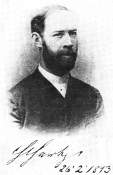 Fifth in the "Men Who Have Made Radio" series,
Heinrich Hertz is honored here for giving mankind what author Hugo Gernsback
appropriately termed "a sixth sense." It was published in the February 1930 issue
of Radio-Craft magazine. Having earned his doctorate with a thesis on "the
distribution of electricity over the surface of moving conductors," Hertz proved
through his experiments the existence of electromagnetic waves - the aforementioned
sixth sense. During his short 37 years on Earth (22 February, 1857- 1 January, 1894,
died of bone disease), Heinrich Hertz accomplished an impressive amount of fundamental
research and discovery, including contact mechanics, electromagnetic radiation,
the emagram graph, a parabolic antenna, the photoelectric effect, the Hertzian dipole
antenna and oscillator. He was remembered fondly as a kind man who placed advancing
the frontiers of science ahead of fighting for credit and spotlight attention... Fifth in the "Men Who Have Made Radio" series,
Heinrich Hertz is honored here for giving mankind what author Hugo Gernsback
appropriately termed "a sixth sense." It was published in the February 1930 issue
of Radio-Craft magazine. Having earned his doctorate with a thesis on "the
distribution of electricity over the surface of moving conductors," Hertz proved
through his experiments the existence of electromagnetic waves - the aforementioned
sixth sense. During his short 37 years on Earth (22 February, 1857- 1 January, 1894,
died of bone disease), Heinrich Hertz accomplished an impressive amount of fundamental
research and discovery, including contact mechanics, electromagnetic radiation,
the emagram graph, a parabolic antenna, the photoelectric effect, the Hertzian dipole
antenna and oscillator. He was remembered fondly as a kind man who placed advancing
the frontiers of science ahead of fighting for credit and spotlight attention...
 Axiom Test Equipment, an electronic test
equipment rental and sales company has published a new blog post that covers how
changing temperatures affects electronic performance and how practical temperature
testing often relies upon having a
temperature chamber capable of changing a wide range of temperatures. Electronic
products are designed for use within specific temperature ranges, according to application,
such as aerospace, automotive, commercial, industrial, medical, and military systems.
Temperature chambers provide the means of controlling temperatures during testing;
and a good chamber can adjust temperatures over a wide range and within a tight
tolerance. Temperature chambers can be sorted by size, weight, and temperature.
Smaller units are ideal for local use, next to a workbench, although the size of
their environmental chambers will limit the size and type of DUT. Larger temperature
chambers do not have the same placement flexibility, but they can handle larger
and more DUTs. Temperature chambers have two key sets of dimensions... Axiom Test Equipment, an electronic test
equipment rental and sales company has published a new blog post that covers how
changing temperatures affects electronic performance and how practical temperature
testing often relies upon having a
temperature chamber capable of changing a wide range of temperatures. Electronic
products are designed for use within specific temperature ranges, according to application,
such as aerospace, automotive, commercial, industrial, medical, and military systems.
Temperature chambers provide the means of controlling temperatures during testing;
and a good chamber can adjust temperatures over a wide range and within a tight
tolerance. Temperature chambers can be sorted by size, weight, and temperature.
Smaller units are ideal for local use, next to a workbench, although the size of
their environmental chambers will limit the size and type of DUT. Larger temperature
chambers do not have the same placement flexibility, but they can handle larger
and more DUTs. Temperature chambers have two key sets of dimensions...
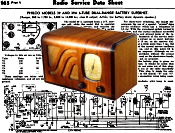 This is another Radio Service Data Sheet
that appeared in the May 1936 edition of Radio-Craft magazine. It was a
dual-band radio covering both 550-1,720 kHz and 5.500-16.000 MHz, AM and
a popular shortwave band, respectively. Power input was DC only, requiring the standard
pair of 67.5 V "B" cells for the high voltage, a 1.5 V (or 2.0 V)
"A" cell for the vacuum tube heater elements, and a 7.5 V "C" cell for biasing.
These DC radio sets were meant to service rural locations with no AC electric service.
No instance of a Philco Model 39 or Model 39A could be located, but it appears numerous
variations of this tabletop radio were made at around the same time. The Philco
Radio Gallery shows a few of the "39" models. I post this schematic and functional
description of the Philco Models 39 and 39A, 6-Tube Dual-Range Battery Superhet
manufacturers' publications for the benefit of hobbyists and archivists who might
be searching for such information either in a effort to restore a radio to working
condition, or to collect archival information... This is another Radio Service Data Sheet
that appeared in the May 1936 edition of Radio-Craft magazine. It was a
dual-band radio covering both 550-1,720 kHz and 5.500-16.000 MHz, AM and
a popular shortwave band, respectively. Power input was DC only, requiring the standard
pair of 67.5 V "B" cells for the high voltage, a 1.5 V (or 2.0 V)
"A" cell for the vacuum tube heater elements, and a 7.5 V "C" cell for biasing.
These DC radio sets were meant to service rural locations with no AC electric service.
No instance of a Philco Model 39 or Model 39A could be located, but it appears numerous
variations of this tabletop radio were made at around the same time. The Philco
Radio Gallery shows a few of the "39" models. I post this schematic and functional
description of the Philco Models 39 and 39A, 6-Tube Dual-Range Battery Superhet
manufacturers' publications for the benefit of hobbyists and archivists who might
be searching for such information either in a effort to restore a radio to working
condition, or to collect archival information...
 Banner Ads are rotated in all locations
on the page! RF Cafe typically receives 8,000-15,000 visits each
weekday. RF Cafe
is a favorite of engineers, technicians, hobbyists, and students all over the world.
With more than 17,000 pages in the Google search index, RF Cafe returns in
favorable positions on many types of key searches, both for text and images.
Your Banner Ads are displayed on average 280,000 times per year! New content
is added on a daily basis, which keeps the major search engines interested enough
to spider it multiple times each day. Items added on the homepage often can be found
in a Google search within a few hours of being posted. If you need your company news to be seen, RF Cafe is the
place to be... Banner Ads are rotated in all locations
on the page! RF Cafe typically receives 8,000-15,000 visits each
weekday. RF Cafe
is a favorite of engineers, technicians, hobbyists, and students all over the world.
With more than 17,000 pages in the Google search index, RF Cafe returns in
favorable positions on many types of key searches, both for text and images.
Your Banner Ads are displayed on average 280,000 times per year! New content
is added on a daily basis, which keeps the major search engines interested enough
to spider it multiple times each day. Items added on the homepage often can be found
in a Google search within a few hours of being posted. If you need your company news to be seen, RF Cafe is the
place to be...
These archive pages are provided in order to make it easier for you to find items
that you remember seeing on the RF Cafe homepage. Of course probably the easiest
way to find anything on the website is to use the "Search
RF Cafe" box at the top of every page.
About RF Cafe.
Homepage Archive Pages
2024:
Jan |
Feb |
Mar |
Apr |
May |
Jun |
Jul |
Aug |
Sep |
Oct |
Nov |
Dec
2023:
Jan |
Feb |
Mar |
Apr |
May |
Jun |
Jul |
Aug |
Sep |
Oct |
Nov |
Dec
2022:
Jan |
Feb |
Mar |
Apr |
May |
Jun |
Jul |
Aug |
Sep |
Oct |
Nov |
Dec
2021:
Jan |
Feb |
Mar |
Apr |
May |
Jun |
Jul |
Aug |
Sep |
Oct |
Nov |
Dec
2020:
Jan |
Feb |
Mar |
Apr |
May |
Jun |
Jul |
Aug |
Sep |
Oct |
Nov |
Dec
2019:
Jan |
Feb |
Mar |
Apr |
May |
Jun |
Jul |
Aug |
Sep |
Oct |
Nov |
Dec
2018:
Jan |
Feb |
Mar |
Apr |
May |
Jun |
Jul |
Aug |
Sep |
Oct |
Nov |
Dec
2017:
Jan |
Feb |
Mar |
Apr |
May |
Jun |
Jul |
Aug |
Sep |
Oct |
Nov |
Dec
2016:
Jan |
Feb |
Mar |
Apr |
May |
Jun |
Jul |
Aug |
Sep |
Oct |
Nov |
Dec
2015:
Jan |
Feb |
Mar |
Apr |
May |
Jun |
Jul |
Aug |
Sep |
Oct |
Nov |
Dec
2014:
Jan |
Feb |
Mar |
Apr |
May |
Jun |
Jul |
Aug |
Sep |
Oct |
Nov |
Dec
2013:
Jan |
Feb |
Mar |
Apr |
May |
Jun |
Jul |
Aug |
Sep |
Oct |
Nov |
Dec
2012:
1 |
2 |
3 |
4 |
5 |
6 |
7 |
8 |
9 |
10 |
11 |
12 |
13 (no archives before 2012)
- Christmas-themed
items
|




























 James Clerk Maxwell's
James Clerk Maxwell's



 Exodus Advanced Communications
Exodus Advanced Communications










 LadyBug Technologies
LadyBug Technologies










